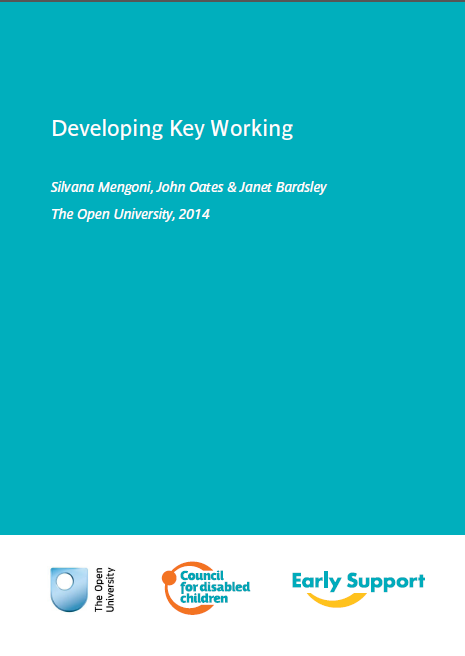
John Oates, The Open University; Silvana Mengoni, University of Hertfordshire; and Janet Bardsley, The Open University
This blog post was jointly authored by John Oates, Silvana Mengoni and Janet Bardsley. The authors applied to the OU’s Engaging Research Seed Funding Scheme to explore the impact of their research into ‘key working’.
Project summary
Key working is a way of supporting families of children with special educational needs and disabilities (SEND), which enables the implementation of the Children and Families Act and Code of Practice (September 2014).
The ‘Developing Key Working’ booklet (the Guide) was produced as the primary output from a research project funded by the Department for Education (DfE) and commissioned through the National Children’s Bureau. This commission included providing the Guide as a print-ready file to be printed and distributed by the Council for Disabled Children.
Our seed funded project was based on the Council for Disabled Children widely disseminating the Guide, with an emphasis on exploring its uptake among potential users who might not have been sufficiently aware previously of approaches to key working in relation to the new legislative frameworks.
Our seed funded project also aimed to explore reasons why local areas may or may not engage with the Guide; with a view to addressing this in future work.
Thus, the ‘publics’ engaged with our seed funded research included commissioners, managers and practitioners in local authorities, managers and practitioners in private, voluntary and independent organisations delivering SEND services, along with families with children with SEND.
Project aims
We planned our seed funded project with the aim of following different publics’ engagement with the ‘Developing Key Working’ guide: parents; young people; practitioners; managers; and commissioners. Our three aims were to:
- Track distribution of the Guide;
- Gather narratives about the uptake of the Guide from the sites involved in its development and other areas where key working is well-established; and
- Evaluate with commissioners, key working teams and families the impacts and utilities the Guide has had in helping local authorities and Private, Voluntary and Independent (PVI) organisations to develop key working services and partnership working with families.
Approach
Our plans crucially relied on the Council for Disabled Children carrying out major national dissemination and monitoring, a key element which we were then expecting to build on. The distribution and promotion of the Guide did not take place as we planned. Instead, a pdf of the print file was made available on the Council for Disabled Children’s website. This compromised our ability to achieve our aims.
The loss of this critical element meant we had to revise our plans and be pro-active in making this happen ourselves; disseminating the Guide through conferences, websites, emails and ‘snowballing’, and delivering the research findings through other channels.
We prioritised disseminating the Guide widely, with a particular emphasis on reaching those who we thought would be less likely to be aware of key working.
- The Guide has been uploaded to the KIDS website and the Foundation Years website, and news items have been posted on these sites about the Guide. It was also distributed via Early Support newsletters.
- 200 copies of the Guide were printed and distributed at conferences and workshops in England and Hungary, and also to professionals in St Lucia, where key working is being implemented across the island’s services, following the guidance we produced.
- The Guide has been adopted, with minor modifications, as guidance for Milton Keynes Citizens Advice Bureau’s way of working by the Milton Keynes Advice Network Partnership.
- We disseminated the Guide to those involved in social work practice and education, including students, employers and service managers. For example, the Guide was used to produce e-learning materials for the RCPCH Disability Matters “Working Together Matters” e-learning session, which is free to access.
- The free .pdf of the Guide has been downloaded more than 2,265 times from the Council for Disabled Children’s website (data at 18-2-2015).
- The Guide is also available as a free download from the Open University’s Open Research Online repository.
Working with sites where key working is well-established versus sites who have not yet developed a well-established key working service
We had planned to work with Early Support Regional Facilitators to identify sites where key working was well-established but due to a reorganisation within Early Support, we were not able to consult directly with the Regional Facilitators.
By recruiting a consultant who had previously been a Regional Facilitator, and had worked within Early Support for many years, we were able to make use of her to interview key persons including commissioners, managers and Regional Facilitators in a number of sites, including those where the initial research had taken place, with established keyworking.
The consultant also made use of her network to interview contacts in areas with less well-developed keyworking.
Lessons learned
Through our work, it became clear that although people were generally aware of the Guide, probably largely because of our dissemination efforts, local areas were prioritising the extensive statutory changes associated with the Children and Families Act. Although managers acknowledged key working as important, developing it was not currently a service priority while they were working on legal and reorganisation issues.
So we learned that our dissemination had been effective, but that a further round of publicity would be appropriate once the legal and reorganizational changes have been implemented and embedded by local areas. We are in early discussions with a major London hospital and a medical Royal College to create a new website to publicise and promote the Guide and other related research outputs from our team that are resources for work with families with young people and children with special educational needs and disabilities.
We have also learned that it is important to plan multiple pathways for dissemination and engagement, particularly when working with organisations with competing priorities. Working closely with national policies and legislation while these are being formulated is risky, because key decisions affecting engagement with the research can be made without consultation.
Researchers need to consider the wide-ranging demands placed on professionals in the education, health and social care sectors, and how these may affect their involvement in a project that may not be considered essential or urgent for service delivery.
Researchers seeking to employ their research to facilitate change in statutory services need to be aware that government departments are the main reference for services in determining priorities, and that it can be harder to bring about change where the dissemination of and engagement with a research project is not wholly and consistently supported by the relevant arms of government.
Outputs
Mengoni, S., Oates, J. and Bardsley, J. (2015, in press). ‘An evaluation of key working for children and young people with special educational needs and disabilities’. British Journal of Special Education.
Mengoni, S., Oates, J., and Bardsley, J. (2014). Developing Key Working. Council for Disabled Children, London. Available from: http://oro.open.ac.uk/40432
Oates, J. (2015). ‘A Guide to Key Working: further afield’. Engaging Research Blog. Available from: https://www.open.ac.uk/blogs/per/?p=5558
Oates, J. (2014). ‘A Guide to Key Working: distributing and publicising’. Engaging Research Blog. Available from: https://www.open.ac.uk/blogs/per/?p=5256
Oates, J. (2014). ‘Developing key working: co-production between researchers and publics’. Engaging Research Blog. Available from: https://www.open.ac.uk/blogs/per/?p=5153
Presentation at OU Equality through Innovation seminar series, 29th July 2014 “Tools to support the developmental progress of children and young people with special educational needs and disabilities”
e-learning session for RCPCH Disability Matters, “Working Together Matters”.
Presentation about the key working evaluation project and the Guide at the Joint Social Work Education and Research Conference held at Royal Holloway, July 2014, “Evaluation of Key Working; parents’ comparison of keyworkers and social workers”.
Acknowledgements
This project was made possible because of the funding made available through the Open University’s RCUK-funded Public Engagement with Research Catalyst, ‘An open research university‘.
Claire Davies, an Independent Consultant, helped with researching local authorities’ and Early Support Regional Facilitators’ engagement with developing keyworking and using the Guide.

